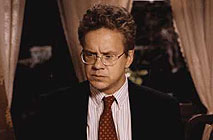|
|
|
|
Human
Nature
|
 |
|
Human Nature had a quiet life in public after its premiere at Cannes in 2001. It was designed as the first follow-up to the remarkably successful Being John Malkovich (1999) by the same team of writer Charlie Kaufman and Spike Jonze – who here acts as a producer, handing over the director's reigns to MTV wunderkind Michel Gondry. Overseas, Human Nature did not receive anything like the level of acclaim for Being John Malkovich, and hence (as if so often the case) its chances for a proper Australian release dwindled. But Adaptation (2002), a later Kaufman-Jonze collaboration, created a new window of opportunity for this odd comedy. It has a wild-child premise. Lila (Patricia Arquette) 'goes native' on account of her abundant body hair. She returns to civilisation because she becomes a best-selling author, and because she craves male companionship. Sadly, she is match-made with Nathan (Tim Robbins), an uptight, ultra-rational scientist. When Lila finds the 'wild man' Puff (Rhys Ifans) in the woods, it is Nathan's dream come true. Using brutal electro-shock punishment, he slowly 'civilises' the frequently recidivist Puff. Meanwhile, Lila pines for her lost innocence. It would be a mistake to think that Kaufman's scripts are actually about what they seem to be about – like celebrity and identity in Being John Malkovich, the creative writing process in Adaptation, or civilisation and its discontents in Human Nature. Increasingly as his career develops, Kaufman seizes on themes that are merely, to him, moth-ridden clichés. His stealthy way of sending them up is to play it straight, seemingly offering these ideas as topics for earnest discussion. The result is weird and certified postmodern: the films display an idiot-grin tranquillity, designed to sucker unhip spectators. (Hence the proliferation of quotation marks any commentator is forced to place around words like civilisation, nature, wild, etc ... ) As a director, Jonze is better with this precarious pose than Gondry. It is too easy to tell, from the word go, that all the bases here are loaded with excessive ridicule. Nathan's mad ideal of civilisation (table manners, classical music, urbane speech) could not win over even the staunchest conservative, while Lila's communing with nature (she even gets to burst into song) is only ever an ersatz joke. If there is something that registers as truthful or personal in Kaufman's sensibility, it is in the smaller-scale patterns of the storytelling. All of his scripts are about the deflation of dreams and the unmasking of identities: disillusionment and disappointment rule, everyone is exposed as deluded or a liar, everything that starts out noble ends up base (as with the quite amusing role for Miranda Otto as Nathan's fruity French assistant). It is like the black comedy side of Billy Wilder's cinema – which was often, in heyday, no less withering – grown to monstrous, maniacal proportions. But when such misanthropy is not connected to some valid, social anger, it becomes merely brittle. It remains to be seen whether Kaufman can rescue himself artistically from the tailspin of Adaptation and turn his fertile imagination to something truly creative. MORE Kaufman: Confessions of a Dangerous Mind MORE Gondry: Eternal Sunshine of the Spotless Mind © Adrian Martin January 2003 |
![]()